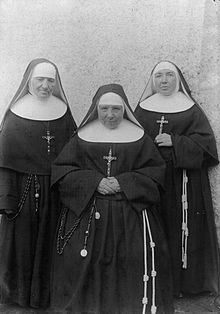Poor Franciscan Sisters of the Holy Family
The poor Franciscan Sisters of the Holy Family or Mallersdorfer Sisters are a Roman Catholic women's order under episcopal law . The congregation was founded by Blessed Paul Josef Nardini in 1855 .
history
On May 7th, 1851 Paul Josef Nardini took over the parish of Pirmasens in the Diocese of Speyer . At that time, the former garrison town was in dire economic straits after the dissolution of the military. The economic misery was compounded by crop failures and riots. While the parents lived from home work and were often on the move as peddlers, many children were left unsupervised and unsupervised, and were fed by begging. The Catholics, who were far in the minority, experienced a very hostile climate.
Nardini soon recognized the causes of the moral conditions in the economic situation and tried to get the support of the Pirmasens citizens for the establishment of a branch of the Niederbronn sisters . In 1853 two sisters came to Pirmasens from Alsace. However, as foreigners, the sisters had to return to their mother house after only two years. In order to continue the arduous beginnings, Pastor Nardini won two women in 1855 who, like Nardini himself, belonged to the Third Order of St. Francis as tertiary women . They were ready to take care of the poor and the sick in the parish. They chose the third order rule as the basis of their lives. The vow of personal poverty was particularly important to them so that they could go out of love for the poor. The new Congregation placed itself under the protection of the Holy Family , because their primary concern was the social and moral strengthening of families. The sisters soon took on a variety of charitable tasks in education, nursing and care for the elderly.
After only two months, ten sisters and thirty children were able to move into their own house. Soon, surrounding parishes also asked for sisters to work in their parishes. The Speyer bishop Nikolaus von Weis granted the order recognition in 1857. The order expanded rapidly despite the early death of its founder (1862). In 1864 some sisters moved to Sibiu in Transylvania at the request of Princess Montenuovo . In the Palatinate, Bavaria and Transylvania, 64 branches were founded by 1869. In 1960 there were already 367 branches. The motherhouse in Pirmasens soon became too small, so in 1869 it was relocated to Mallersdorf Monastery , a Benedictine abbey that was secularized in 1803 . The popular name "Mallersdorfer Sisters" , which is still used today, is derived from this mother house of the congregation .
Branches

| place | Surname | Facility | founding | resolution |
|---|---|---|---|---|
| Pirmasens | Nardini house | Children's home, kindergarten, | 1855 | |
| Pirmasens | Nardini house | Day care center, | 1855 | |
| Pirmasens | Nardini house | Elementary / secondary school | 1855 | |
| Pirmasens | Nardini house | Nurses' home | 1855 | |
| Walldürn | Children and Youth home | Children's home | 1858 | |
| Walldürn | St. Kilian | Children's home | 1859 | |
| Zweibrücken | St. Elisabeth Hospital | Hospital, kindergarten | 1859 | |
| Zweibrücken | hospital | Vocational school for nursing | 1860 | |
| Greding | Caritas retirement home | Retirement home, kindergarten, nursing, handicraft lessons | 1860 | 2012 |
| regensburg | Seminary | Seminar, pastoral care | 1861 | |
| Landstuhl | St. John's | Hospital, | 1861 | |
| Landstuhl | hospital | Nursing home, | 1862 | |
| Landstuhl | hospital | Vocational school for nursing | 1863 | |
| Mintraching | District hospital | Retirement home, kindergarten | 1861 | |
| Parsberg | educational center | Children's home, boarding school, | 1861 | |
| Parsberg | educational center | Vocational school for geriatric care | 1862 | |
| Parsberg | educational center | School for ore. Help | 1863 | |
| Bad Reichenhall | hospital | last in the town built between 1928 and 1930 . hospital | 1867 | 2000 |
The congregation today
The sisters run day nurseries, nurseries, kindergartens and housekeeping schools. They work in hospitals, in outpatient nursing and in old people's homes. They run a Kneipp spa in Bad Wörishofen.
The branches in Romania (formerly Transylvania) now belong to an independent province. Since 1955 the sisters have also worked in the South African mission . Today the sisters are primarily active there in AIDS education and the care of infected people.
Over 500 sisters live in the mother house of the congregation in Mallersdorf. Sr. M. Jakobe Schmid is the general superior at the head of the community . It is elected by the general chapter, which meets every 6 years, and is appointed by the general council, which consists of the vicar general (Sr. M. Melanie Gollwitzer) and three general councilors (Sr. M. Rebekka Deiminger, Sr. M. Catherini Brucker and Sr. M Magdalen Lay) is supported. A superior supports the sisters and is appointed by the Regensburg bishop .
The monastery brewery is also located in the mother house and is managed by sister Doris as master brewer .
Web links
Individual evidence
- ↑ Greding: Franciscan Sisters Libania and Robertis return to the mother house ?? Farewell in the nursing home . In: donaukurier.de . ( donaukurier.de [accessed on March 23, 2018]).
